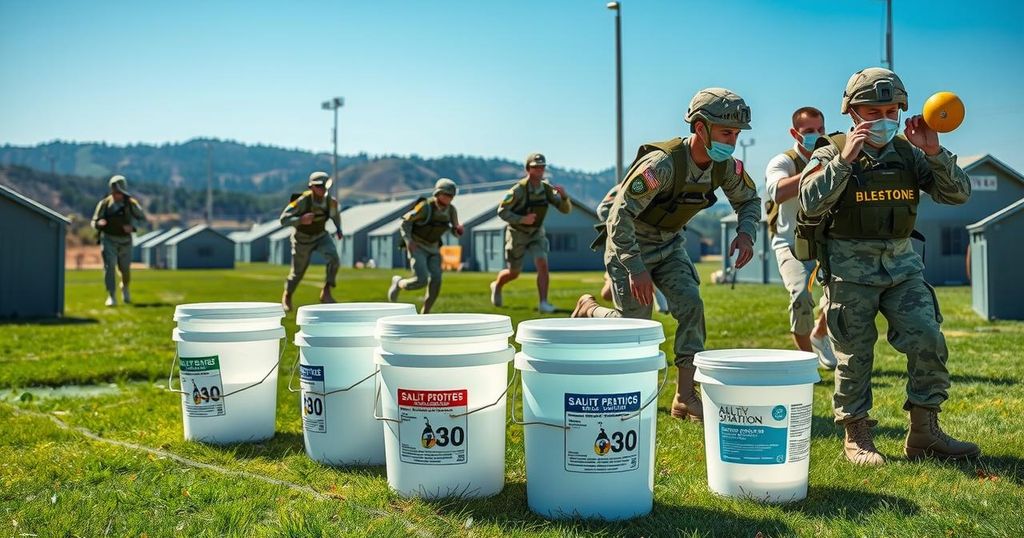Lifestyle
101ST AIRBORNE DIVISION, AFRICA, AIR ASSAULT, ARMY, ARMY SPC, BARCLAY TRAINING CENTER, DIVERSITY, EDUCATION, FERGUSON, HEADQUARTERS AND HEADQUARTERS BATTALION, HEADQUARTERS SUPPORT COMPANY, HEALTH, HEALTHCARE, JFC, JFC - UA, JOINT FORCES COMMAND, JOINT FORCES COMMAND – UNITED ASSISTANCE, KENOS, LIBERIA, MARK, MENTAL HEALTH, MONROVIA, OKLAHOMA, TYLER MARK, UA, UNITED ASSISTANCE, WILLIAM FERGUSON, WISCONSIN
Marisol Gonzalez
0 Comments
Troops Stick to Health Practices in Liberia
- Troops in Liberia prioritize health practices during deployment.
- Service members engage in exercises and hygiene to stay fit.
- Frequent hand washing and temperature checks are mandatory for soldiers.
- Preventative medicine teams conduct weekly health inspections.
- Soldiers show strong compliance with health guidelines via surveys.
Troops Focus on Health Practices for Mission Success
In Liberia, troops deployed under Joint Forces Command – United Assistance are dedicating considerable efforts toward maintaining their health and well-being. Service members constantly engage in many health practices, which include frequent hand washing, exercising, and even learning new techniques geared towards enhancing their mental resilience. An emphasis on personal hygiene is crucial, especially as these soldiers play an integral role in assisting the local populace and government of Liberia during this humanitarian mission.
Command Influence Drives Soldiers’ Health Compliance
Army Capt. Tyler Mark, who serves as the force health protection officer for the JFC-UA surgeon cell of the 101st Airborne Division, has stated that compliance with health standards is being actively managed. He shared that command influence is fundamental, highlighting how soldiers are more likely to adhere to health guidelines when they know that their commanding general prioritizes health protection. However, he notes that most soldiers are self-motivated to maintain their health practices, regularly utilizing bleach buckets to sanitize their hands and undergoing temperature checks at least twice daily.
Preventative Medicine and Teamwork Keep Soldiers Healthy
The JFC-UA has instituted a preventative medicine system that ensures soldiers not only follow health practices but also have access to the necessary resources and a clean living environment. Collaboration between the 61st Preventative Medicine Detachment and the 463rd Veterinary Detachment under the 86th Combat Support Hospital facilitates regular inspections of dining facilities and testing of food and water received. This layered approach includes preventative medicine teams that conduct visits to each camp, ensuring an organized check of hygiene practices, quality control of food and water, and compliance with personal protective equipment usage among soldiers.
Data Tracking Enhances Health Monitoring
Capt. Mark’s team further employs a comprehensive tracking system that collates data on soldiers’ health. Every JFC-UA camp provides daily reports on health-related incidents, giving a clear picture of overall health within the unit. To bolster this system, an anonymous survey designed by Col. Todd Vento aims to determine how well soldiers adhere to health guidelines, which includes verifying adherence to anti-malarial medication and other preventative measures. The responses indicated a strong compliance rate, reflecting well on the effectiveness of the health maintenance initiatives in place.
Understanding Malaria Threat: Monitoring and Management
Notably, the presence of malaria-carrying mosquitoes poses a significant concern. While the reported cases of malaria among troops remain at zero, the risk remains tangible, with estimates suggesting that between 11 to 50 percent of deployed soldiers may be at risk of mosquito bites. Capt. Mark emphasized the unique nature of this deployment, pointing out the controlled conditions pertaining to public health, contrasting sharply with traditional deployments marked by higher troop mobility. He assured that health and safety standards will steadfastly be upheld regardless of the context at hand, as returning healthy from missions remains a top priority for all involved parties.
The ongoing efforts of troops deployed in Liberia under Joint Forces Command – United Assistance emphasize the importance of maintaining health and wellness during humanitarian missions. Personal accountability, supported by command influence and systematic health monitoring, forms the backbone of these efforts. With a solid partnership across various medical entities, soldiers remain vigilant against health risks, particularly malaria, while ensuring their readiness to assist the Liberian community effectively.




Post Comment